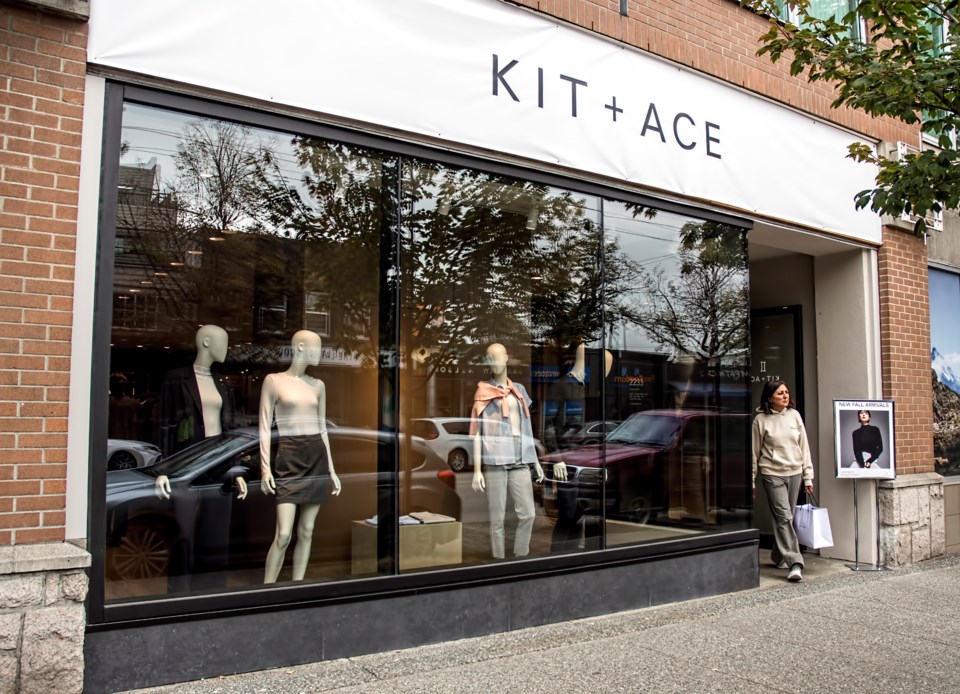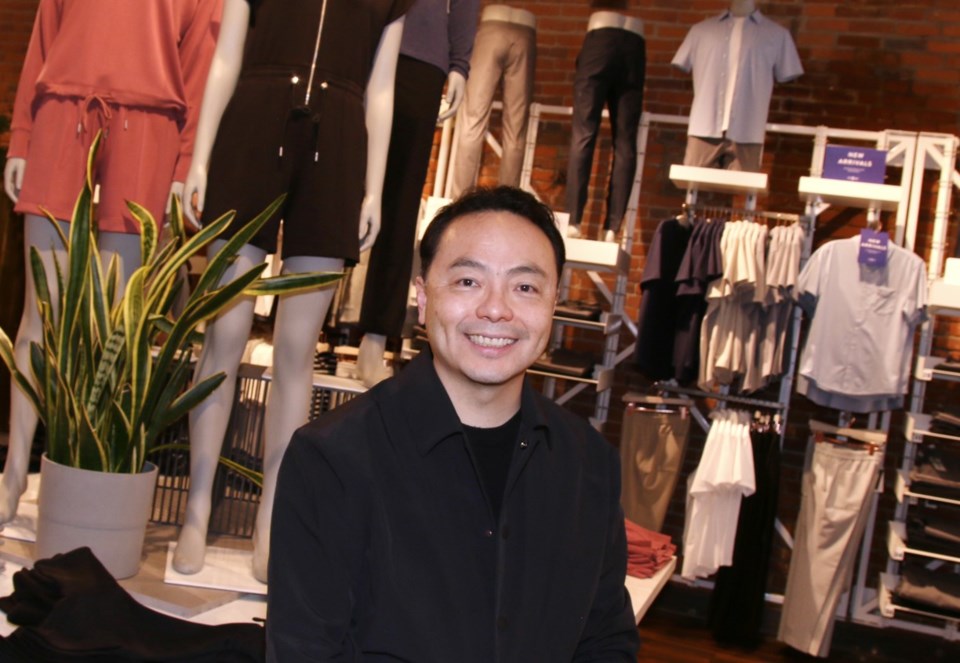When Kit and Ace last month opened its second Vancouver location and ninth location in ÎÚÑ»´«Ã½, it demonstrated the 10-year-old company’s resilience, and optimism from new owners at Unity Brands.
CEO David Lui told BIV having great locations is key in retail and that his fashion chain is taking its time finding future locations to open stores.
He likes the new location at 2233 West 4th Avenue because it is in the heart of a shopping strip with many fashion retailers. Lui cancelled plans to open a few stores this year because he decided that the locations were not strong enough, he said.
Kit and Ace has had a volatile history.
It shot out of the gate with its first store in Gastown in July 2014, and within two years had .
, then realized that its revenue could not support such a large global footprint.
They incrementally , and in April 2017 laid off staff at the company’s Vancouver headquarters and parted ways with the company’s president, Wendy Bennison.
That left nine Canadian locations, and the chain’s store count continued to fall.
By October 2019, when the Wilson family , the chain had six stores. Four other executives bought the company’s remaining shares to allow the Wilson family to completely exit from their investment.
The COVID-19 pandemic disrupted business, and Kit and Ace’s store count had dropped to four by July 2023, when Tsogas and the other executives sold their shares to Unity Brands.
Stores at the time were in downtown Toronto, Oakville, Calgary and in Vancouver’s Gastown.
“Kit and Ace is a very different brand from what it was when the Wilsons were running it,” said retail analyst and Retail Insider owner Craig Patterson.
“It was all about technical cashmere at first and I don’t think that’s part of it at all now. It’s just urban wear with a modern aesthetic.”
Lui confirmed that the company no longer uses the technical cashmere that was central to its product line a decade ago.
He described the company’s clothing as having “timeless technical fashion,” because of designs that make it comfortable to wear and easy to maintain.
“We’re not chasing fads,” Lui said.
Patterson said one of Kit and Ace’s biggest tasks is to educate the consumer about what the company stands for, what materials it uses in its products and why its clothing is worth the price.
A recent online sale offered three plain T-shirts for $99, which is more than customers would pay at a Uniqlo, H&M or Gap store, Patterson said.
Online shoppers who cannot touch and feel the product before making their purchases need to understand the products’ value proposition, he added.
Lui explained that Kit and Ace T-shirts are not cotton, but rather a “viscose, poly-spandex” blend of materials that enable sweat to be wicked away from the skin and for the shirts to resist odours.

New ownership brings advantages
Unity Brands’ principals offer Kit and Ace a team that has comparatively deeper pockets than its previous owners. The principals also bring a wealth of retail experience and some sister companies.
Lui co-owns Unity Brands with Frank Rocchetti and Joe Mimran. All three have enjoyed retail success.
Lui’s experience includes a five-year stint as vice-president of marketing at the Canadian Tire Corp. (TSX:CTC-A) banner Mark’s and a stint as a vice-president at the company’s subsidiary FGL Sports, known for its Sport Chek chain.
Rocchetti has had senior roles at Sears, Loblaws, Coles Australia and Kroger in the U.S.
Mimran is likely best known for founding the Club Monaco and Joe Fresh brands.
The three have built Unity Brands into a curious retail venture in that its holdings span seemingly unrelated retail niches.
A month after Unity Brands bought Kit and Ace, it bought Vancouver-based Casca Footwear. It then in January closed a deal to buy Mastermind Toys.
Larger retail businesses that have multiple store banners or brands often specialize within a retail subsector.
The Gap Inc. (NYSE:GPS), for example, owns the fashion banners Old Navy, Banana Republic, Athleta and Gap while LVMH owns more than a dozen luxury brands, such as Louis Vuitton, Givenchy and Bvlgari.
“The companies that Unity Brands purchased were distressed,” Patterson said. “I don’t know if this would be their strategy, but it could be that they will take these distressed companies and either build them, or build them to a degree, and sell them.”
Instead of calling Unity Brands’ store banners distressed, Lui said he prefers to describe them as “opportunities.” He added that they are all good-value strong brands that were worth buying.
Despite being in different retail subsectors, the three banners add value to each other, Lui said.
Unity Brands has a Greater Toronto Area warehouse and distribution centre that all three store banners use—something that reduces costs.
There could also be future synergies within the fashion niche, given that two of the Unity Brands owners have a separate investment with another fashion brand.
Rocchetti, Mimran and Mimran’s Gibraltar & Co. in 2018 bought the adventure-wear brand Tilley, which was formerly known as Tilley Endurables.
Much of Tilley’s business is through wholesales to other retailers but the venture has a flagship store in Toronto, an outlet store just outside Toronto and a store in Calgary that opened in May with a 10-month lease that could be renewed if it is a success, Lui said.
A fourth Tilley store is likely to open in Oakville, Ontario, within the next couple months, he added.
“We would love to open a Tilly store in ÎÚÑ»´«Ã½ but we just haven’t found the right location,” Lui said.
Alex Tilley founded Tilley Endurables in 1980 and he oversaw about half a dozen stores in ÎÚÑ»´«Ã½ for decades. His brother, John Tilley, and John’s family ran the company’s West Coast operations for decades out of a store on Granville Street at West 8thAvenue.
Alex then sold the company to U.K.-based Hilco Capital in 2015.
“Tilley has a heritage name to it,” Patterson said.
“For those old enough to remember Tilley Endurables it is an iconic brand.”
He said that it would be smart for Mimran and Rocchetti to expand Tilley to have a storefront in Vancouver partly to bring more brand awareness but also because it is a brand that would benefit from having sales staff who know the products well.
“Staff at the Hudson’s Bay or Dillard’s [Inc. (NYSE:DDS) or other stores where you might find some Tilley hats may not know the technicalities or be able to sell the products properly,” he said.

